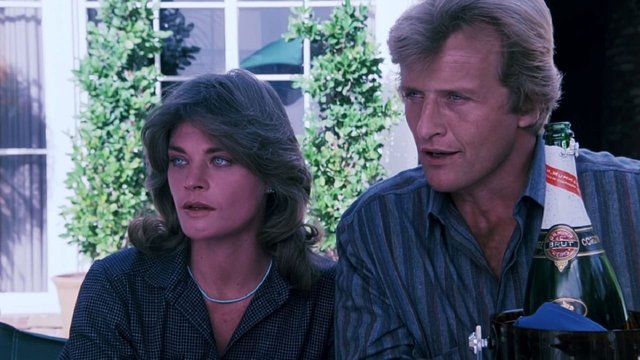Film Review: The Osterman Weekend (1980)

It is quite rare for great film maker to end the career with a masterpiece or very good film, but, despite that, many were quite disappointed by the film that would turn out to be a swan song for Sam Peckinpah. Director, famous for some of the most iconic and influential western and action films of late 1960s and early 1970s, delivered something way below his standards with 1983 adaptation of The Osterman Weekend, best-selling spy thriller novel by Robert Ludlum.
The protagonist, played by Rutger Hauer, is John Tanner, television reporter who hosts hard-hitting talk show. He has small set of college friends with whom he holds regular reunions – plastic surgeon Richard Tremanyne (played Dennis Hopper), stock trader Joseph Cardone (played by Chris Sarandon) and television producer Bernie Osterman (played by Craig T. Nelson). He is about invite them and their wives (played by Helen Shaver and Cassie Yates) to the home he shares with his wife Ali (played by Meg Foster) and son (played by ChristopherDa Starr). Before that happens, he is approached by CIA operative Lawrence Fassett (played by John Hurt) who asks him to help him in matters of national security. While pursuing the murderers of his wife, Fassett has discovered that trio of Tanner’s friends belong to the secret network of KGB agents called Omega. Fassett wants Tanner to help him make one of them defect. Tanner reluctantly agrees in exchange for having Fassett’s rabidly anti-Communist and politically ambitious boss Maxwell Danforth (played by Burt Lancaster) appearing on his next show. His friends arrive to the home which is filled with hidden microphones and cameras. Although they don’t know it, they begin to feel tension and the reunion soon turns out to be anything but happy. Even bigger problems arise when Tanner discovers that Fassett didn’t was exact true with his intentions.
Peckinpah was known for being difficult on the set and always clashing with producers. By late 1970s this reputation, made worse by his excessive drinking and drug use, finally led to him becoming some sort of persona non grata in Hollywood studios and he had to wait five years before being given opportunity to direct his next feature film. He enthusiastically embraced it and that enthusiasm was matched by many respected actors and actresses who wanted to appear in a film directed by old master. The result is diverse and formidable cast that represents the best part of The Osterman Weekend. Rutger Hauer does more than adequate job in his first Hollywood role as protagonist, and he is well-matched by John Hurt who plays rather complex character torn between terrible emotional loss and psychopathic madness. Burt Lancaster is also very effective in relatively small but chilling role of a spymaster who argues that USA, by having to respect civil liberties, is at disadvantage in Cold War. Craig T. Nelson also does good job as Osterman, while Meg Foster (whose real life son Christopher appears in the film) very realistically plays housewife whom circumstances transform into woman warrior. Helen Shaver is also interesting as Tremayne’s cocaine-addicted wife. Otherwise fine actors like Dennis Hopper and Chris Sarandon are wasted in their roles, though.
All that great cast, however, didn’t rescue The Osterman Weekend from being rejected by critics and called a failure, which is a notion which is generally held to this day. The main reason could be found in terrible script by Alan Sharp. Apparently unable to streamline byzantine complexities of Ludlum’s plot into feature film format, Sharp tries to compensate it with sometimes annoying exposition that, among other things, telegraphs the “surprise” plot twist in the middle of the film. The Osterman Weekend also has some gaping plot holes and some of them are, sadly, created by Peckinpah who tried a little bit too much to create as much action scenes as possible in order to apply his trademark technique of slow motion. This results in the spectacular but utterly pointless car chase scene in the first part, as well as confusing night showdown at Tanners’ estate, which is followed by even more confusing and disappointing finale. The only thought-provoking detail of the film is extensive use of video cameras and monitors which symbolise complete lack of privacy and omnipresence of surveillance. This looked like something new and dystopian to audience in early 1980s, but it is quite common in today’s world. Possible prophetic dimension of the film is somewhat compromised by the opening scene in which Fassett’s wife (played by Danish actress Merete Van Kamp) appears in steamy sex scene with her husband only to be brutally murdered while being recorded by hidden camera. The scene was often deemed exploitative and misogynistic and in many ways permanently sank the reputation of film. Peckinpah, who died in 1984, fared somewhat better due to critics proclaiming The Osterman Weekend to be “the work of a tired and broken man”. Whether he bears ultimate responsibility for its failure or not would not matter much to the viewers whose expectations are based on Peckinpah’s past successes.
RATING: 3/10 (+)
Blog in Croatian https://draxblog.com
Blog in English https://draxreview.wordpress.com/
Leofinance blog https://leofinance.io/@drax.leo
Cent profile https://beta.cent.co/@drax
Minds profile https://www.minds.com/drax_rp_nc
Uptrennd profile https://www.uptrennd.com/user/MTYzNA
Hiveonboard: https://hiveonboard.com?ref=drax
Rising Star game: https://www.risingstargame.com?referrer=drax
1Inch: https://1inch.exchange/#/r/0x83823d8CCB74F828148258BB4457642124b1328e
BTC donations: 1EWxiMiP6iiG9rger3NuUSd6HByaxQWafG
ETH donations: 0xB305F144323b99e6f8b1d66f5D7DE78B498C32A7
Movie URL: https://www.themoviedb.org/movie/12239-the-osterman-weekend
Critic: A